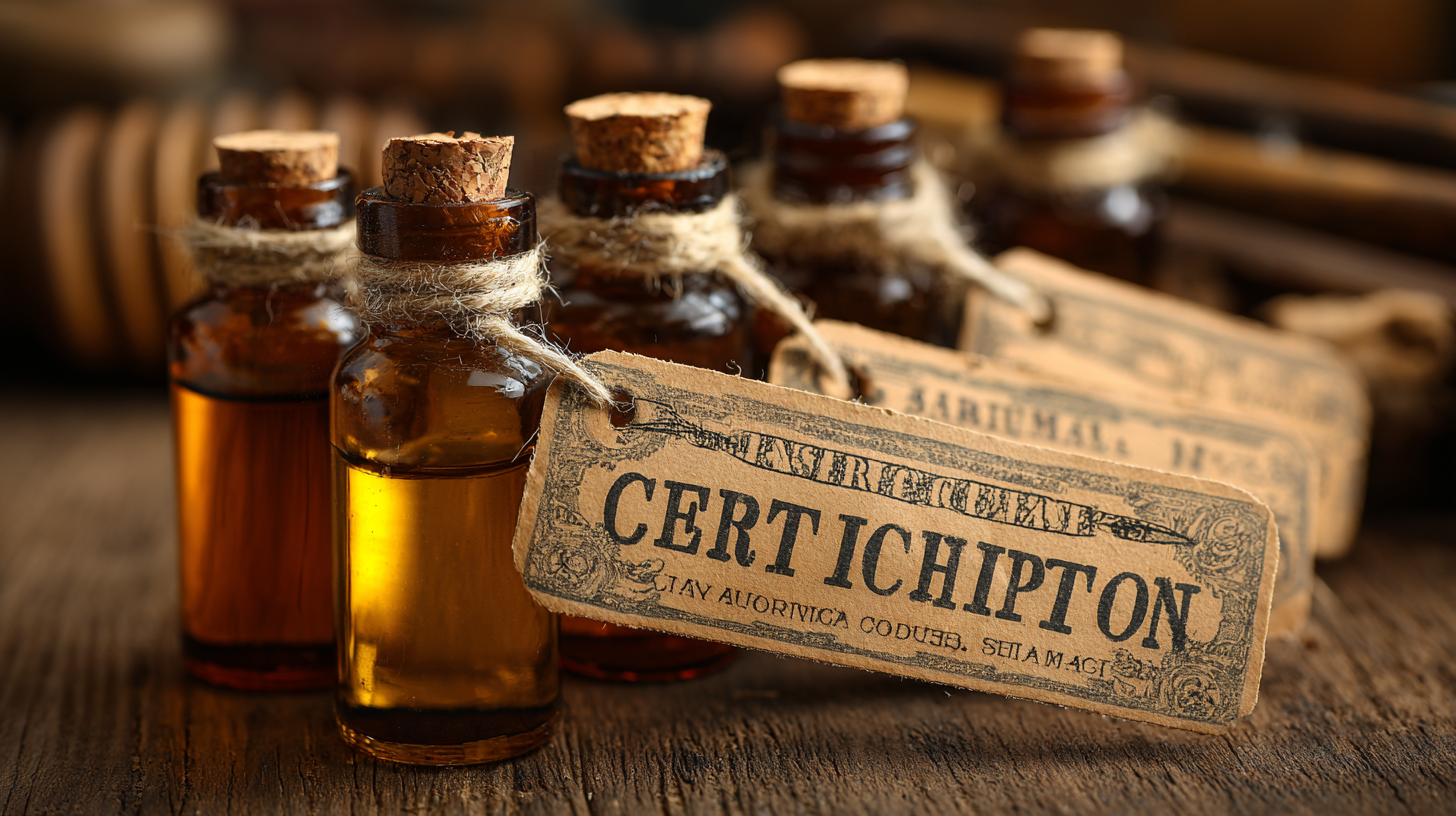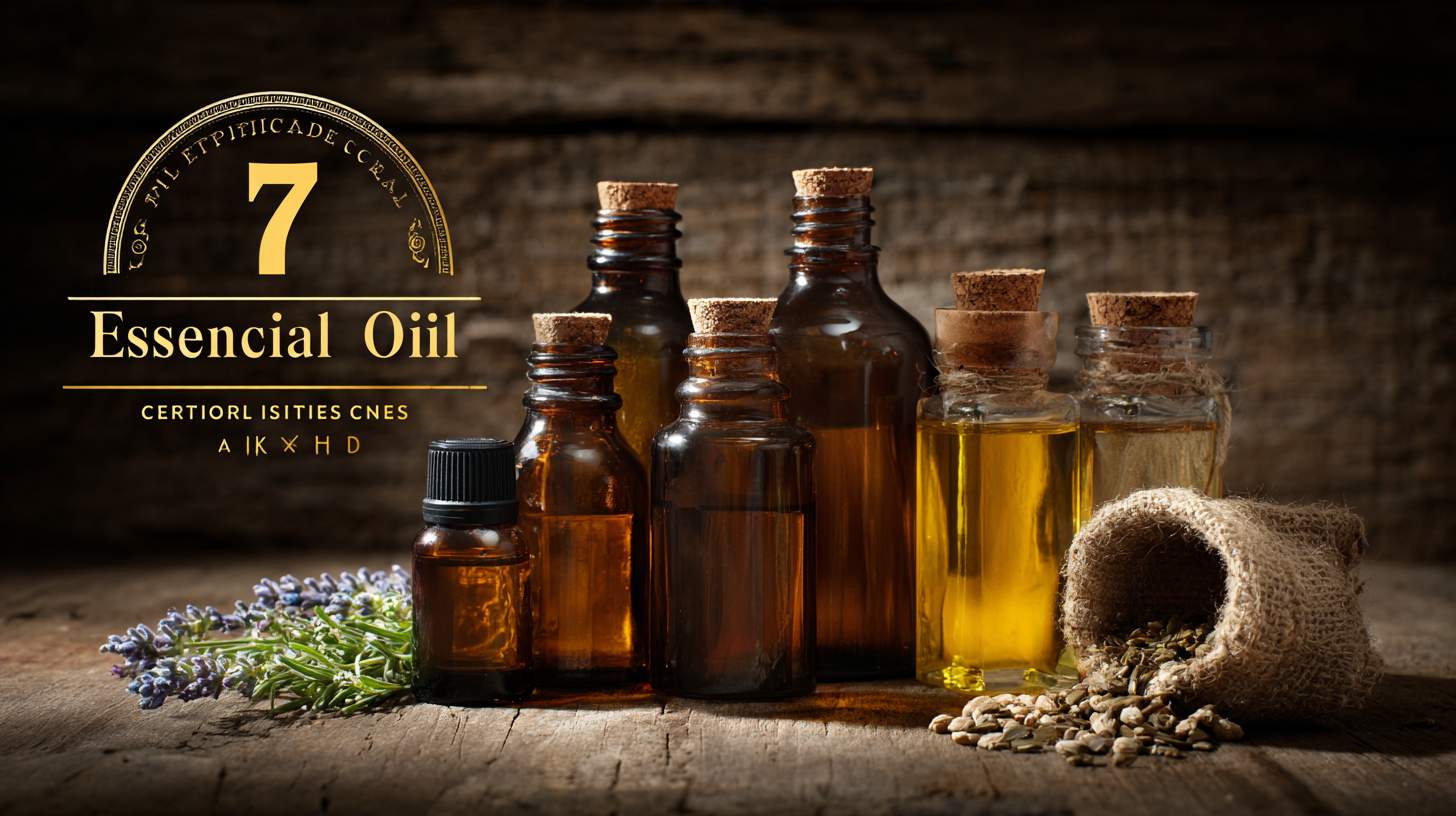

The global essential oil market has seen remarkable growth, anticipated to reach USD 13.94 billion by 2026, growing at a CAGR of 8.6% from 2021 to 2026, according to a report by Mordor Intelligence. As this lucrative market expands, the importance of certifications for essential oil imports cannot be overstated. Buyers must navigate a complex landscape of regulatory requirements, quality assurance standards, and safety protocols to ensure they source high-quality oils that comply with international standards. However, many potential importers face challenges and pitfalls due to a lack of knowledge about necessary certifications, which can lead to subpar products or even legal issues. This blog aims to illuminate the essential certifications every buyer should be aware of to unlock success in their essential oil ventures.

When importing essential oils, understanding the importance of certifications is crucial for both compliance and product quality. According to a report by Grand View Research, the global essential oils market was valued at approximately $18.6 billion in 2020 and is expected to expand at a compound annual growth rate (CAGR) of 8.6% from 2021 to 2028. With such rapid growth, regulatory scrutiny is increasing, making import certifications essential for buyers looking to ensure their products meet international standards.
Certifications such as the ISO (International Organization for Standardization) and USDA Organic not only affirm the quality and safety of essential oils but also enhance consumer trust. A study from the National Association for Holistic Aromatherapy indicates that over 70% of consumers prioritize certified products, reflecting a trend where buyers are increasingly aware of the source and quality of their essential oils. Furthermore, compliance with these certifications can provide a competitive edge in a crowded market, where differentiation is key to attracting discerning customers.
In the essential oil trade, certifications play a crucial role in establishing trust and ensuring product quality. Buyers looking to source essential oils should be aware of key certifications that act as benchmarks for authenticity and safety. One of the most important is the ISO 3515 certification, which guarantees that oils meet international quality standards. Another critical certification is the USDA Organic label, which assures buyers that the oils are derived from plants grown without harmful pesticides or synthetic fertilizers. These certifications not only enhance the credibility of the supplier but also provide buyers with confidence that they are investing in high-quality products.
Moreover, the Certified Pure Therapeutic Grade (CPTG) certification is gaining traction among discerning buyers. This certification focuses on purity and efficacy, ensuring that the oils are free from contaminants and synthetic additives. Additionally, the European Union's Ecocert certification confirms adherence to strict organic farming and sustainability standards. By understanding these essential certifications, buyers can make informed decisions and forge reliable partnerships in the essential oil market, ultimately unlocking greater success in their ventures. Investing time to verify these quality markers not only fosters trust but also enhances the overall consumer experience in the realm of essential oils.

Navigating the regulatory landscape for essential oil imports can be a daunting task for buyers, as compliance is crucial to ensure the quality and legality of the products. According to the International Organization for Standardization (ISO), the global essential oil market was valued at over over USD 8 billion in 2020, and it continues to grow, driven by the increasing demand for natural ingredients in cosmetics, food, and pharmaceuticals. As a result, understanding the certifications required for importing essential oils is essential for success in this competitive market.
One of the key certifications is the Good Manufacturing Practice (GMP) standard, which outlines the necessary procedures to ensure products are consistently produced and controlled according to quality standards. Another important certification is the International Fragrance Association (IFRA) compliance, which provides guidelines on the safety aspects of fragrance materials, including essential oils. Buyers should also be aware of regional regulations that may affect their imports, such as the European Union's REACH regulations, which govern chemical substances.
When it comes to ensuring quality and safety in the essential oil market, verifying certification authenticity is paramount. With the growing global demand for essential oils, buyers often face challenges in differentiating quality products from substandard ones. Authentic certifications act as a badge of credibility, reflecting adherence to industry standards that guarantee the safety and efficacy of the oils being purchased. However, not all certifications are created equal, making it essential for buyers to know how to discern the legitimacy of these certifications.

Recent developments in various sectors highlight the increasing importance of stringent quality assurance measures. The appointment of experienced professionals to oversee quality management, as seen with the recent leadership changes in pharmaceutical companies, emphasizes the commitment to quality and compliance. Similarly, initiatives to enhance certification systems, such as those aimed at strengthening the automotive industry's certification processes, reflect a broader recognition of the need for robust verification mechanisms.
Buyers of essential oils should leverage these insights and tools to verify the authenticity of certifications, ensuring that they are selecting products that meet high-quality standards and truly provide the benefits they promise.
When importing essential oils, understanding compliance with import standards is crucial for success. Varied regulations exist across different markets, and buyers must be vigilant about certifications to ensure quality and safety. Research indicates that in 2022, the global essential oils market was valued at approximately $18 billion and is expected to grow at a CAGR of 8.5% through 2030. This growth underscores the importance of adhering to import standards which can impact market entry and product acceptance.
To navigate these compliance requirements, familiarizing oneself with industry certifications is essential. For instance, the Organic Certification can significantly enhance marketability in regions with stringent organic product guidelines. Moreover, regulatory bodies such as the International Organization for Standardization (ISO) provide frameworks that importers can follow to ensure that products meet international quality standards. By prioritizing compliance and obtaining the right certifications, buyers can not only streamline their import processes but also mitigate potential trade barriers, ultimately leading to a more profitable business operation. As the EU adjusts its regulations to facilitate trade of US gas by considering methane emissions standards, the essential oils market too must stay abreast of evolving regulations to ensure continued access and success in global markets.